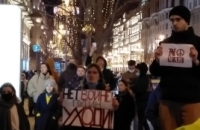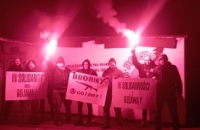UTOPIA OF FINANCES
Grzegorz Piotrowski – The Present economical crisis in the USA in the eyes of social movements
When economical, political and social consequences of neoliberalism are considered at the turn of the 20th and 21st century, it is clear that neoliberalism has become the most criticised political doctrine. Some activists proclaim victory. The problem is that the end of that doctrine does not mean the end of capitalism.
George Caffentzis – Notes on the "Bailout" Financial Crisis
The mortgage crisis in the US is the effect of two proletariats: (1) the US proletariat's inability to increase wages (there have been almost no strikes of significance in the US in the last few years) and workers’ reliance on credit and equity to satisfy their subsistence needs (traditionally the attributes of rentiers) and (2) the Chinese proletariat's success, through thousands of strikes and protests, in increasing wages and forcing more investment in its social reproduction.
WAR – MEDIA – CONTROL
Carl Boggs – Pentagon Strategy, Hollywood, and Technowar
With the growth of U.S. imperial power and its military reach, warfare today extends across the cultural as well as the institutional and battlefield terrains, the result of great technological changes now altering the very character of modern combat.
Carl Boggs, Tom Pollard – Hollywood War Machine
Explores the U.S. film industry and its deepening impact on the popular and political culture. It is a hard-hitting, radical critique of the growing culture of American militarism that can not be understood without taking into consideration the increasing impact of the US film industry on popular and political culture, in the context of the permanent war economy, security state, recurrent military interventions abroad, and the expansion of U.S. global power.
P. Sainath – War, Propaganda, Empire
Right through the 70s and the 80s, two of the fastest growing sectors of the global economy were information and armaments. And the growing integration between these two sectors, the rapid integration between the sectors of information and armaments, had and and continues to have very obvious implications for the content of information that we get, and for the kind of media environment that we live in.
Jarosław Urbański – Polish media and war crime in Nangar Khel
When the Polish liberal media comment on the firing against civilians that took place in Nangar Khel they usually try to find justification for soldiers taking part in the intervention in Afghanistan and Iraq. This one-sided attitude of the media is astonishing, and it is possible to notice their ideological character when analysing and comparing their reports on other armed conflicts.
HOUSING QUESTION AND SOCIAL RESISTANCE
Andrzej Smosarski – Polish turmoil around housing question
In a few aspects of life the system transformation has become a huge threat for citizens, one of them is housing policy. In any other area of life fanaticism of the system in promoting ownership over human and social rights has not turned out to be so brutal.
Jakub Grzegorczyk – Problems of tenants in a globalized city. Example of Warsaw.
Neoliberal globalization has an incredible capability of reducing the importance of housing question. Of course it does not mean that development of globalization solves social problems, but „social aspects” are pushed aside to margins of public debate.
Piotr Ciszewski – In defence of tenants' rights
Origins and development of tenants' movement reflect public awareness. For many years organizing by tenants was considered as unnecessary. Some people had to pay for that conviction with their houses.
An interview with members of Tenants Association from Warsaw
When I had investigated the case of tenement housing where I live, when I had met tenants of houses similar to mine, I realized that the reason for tenants' problems is rooted in the system itself. A singular person has no chance of changing that. So I found it necessary to organize and look for allies who radically want to change the politics of local government at that field.
Wrocław versus anarchy
The city is open, but only for affluent, well-mannered and well-educated youth, whose value-system corresponds with conservative values of the rulers in Wrocław. For the poor there is nothing left but philanthropy, if health services are going to be privatized and controlled by the market.
Dorota Jędruch – Joyful league against landlords
The history of the tenants movement is a part of the rich and colourful history of Paris. The activities of anarchists from the tenants association before the First World War was commemorated by popular songs and poems of that time. Their funny, provocative actions were visible at Parisian streets and in the press.
Struggle against evictions – Sao Paulo 1945-1948
Part of the book Social Struggles in the City: the Case of Sao Paulo.
Dey Krahorm – struggle against evictions in Cambodia
Dey Krahorm was taken over in 1980. Although it was a marshland before, it became home for 850 families. Because they are poor, they can not afford to pay court fees, so are at the mercy of any corporation who will make an attempt to take the land.
NEW MARKET – NEW CLASS
Aufheben – Class conflicts in the transformation of China
Yet in less than a generation China has moved from one of the most egalitarian societies in the world to one of the least egalitarian. Although tens of millions of people have become substantially better off in material terms, the position of hundreds of millions has become worse.
Chris Chan, Pun Ngai – From legality- based to interest- oriented labor protests: a study of collective actions of migrant workers in South China
Through looking into the collective actions of rural migrant workers in the Pearl River Delta, we attempt to sketch the formation of a new working class in China. In this study, we argue that most of the recent collective actions engendered workers’ conflict with management at the point of production, while simultaneously entailing labor organizing and collective actions at the terrain of daily reproduction at the workers’ dormitories and communities.
Pun Ngai – Women workers and precarious employment in Shenzhen Special Economic Zone, China
In spite of the increase in transnational codes of conduct and legal mobilisation of labour, despotic labour regimes in China are still prevalent. Globalisation and ‘race to the bottom’ production strategies adopted by transnational corporations work against the improvement of labour relations in China.
SYNDROME OF CHINESE CAPITALISM
China Labour Bulletin - Worker Passivity in China - A Maoist Myth
It is often assumed that Chinese workers have been passive and loyal government subjects enticed into submission by the so-called 'iron rice bowl'. Recent research proves this not to be the case.
Burt Green - The Meaning of Tienanmen
The events of May-June 1989 in Beijing appear as the reassertion of a critical Chinese historical consciousness over the official lies presented by totalitarian bureaucratic capitalism.
NONWESTERN ANARCHISMS
Dimensions of Chinese Anarchism. An Interview with Arif Dirlik
There has been an „Orientalist” tendency to attribute everything new in China to Chinese tradition, which is another way of saying that there is never anything significantly new in China, anything that cannot be explained in terms of the past. I have been a critic of this tradition in Chinese historiography. (...) I came to study Chinese anarchism by tracing the origins of this notion of social revolution, and I believe that Chinese anarchism was a radical, new idea.
Jason Adams Nonwestern anarchisms – rethinking the global context
The historiography of anarchism has focused almost entirely on movements of the West and the North, while movements amongst the peoples of the East and the South have been widely neglected. Most available anarchist literature does not tell this history, and speaks not to a necessarily malicious disregard of non-Western anarchist movements but rather to the fact that even in the context of radical publishing, centuries of engrained eurocentrism has not really been overcome.
Karina Gąsiorowska – Programme of pre-war anarchists in Japan
The Japanese anarchist movement was searching for real solutions. Even if these solutions were not completely realized, the movement had the support of the masses, who were a real threat for power system of that time.
GENDER AND CLASS
Jarosław Urbański – The origins of radical women labour movement in Wielkopolska
The rise of women in the market in Wielkopolska in the first decades of 20th century resulted in women's mobilization not only in the struggle for social benefits, but also in the political struggle for equality.
We are all women – interview with Monika Bobako
A suggestion that all women are part of one class was something insulting for women from the lower social stratum. For them a „golden cage”, where rich women were trapped, was an inaccessible luxury.
REVOLUTION IN GERMANY
Andrew Flood – The German revolution
Looking back it is sometimes hard to realize the panic the European ruling class was in at the end of the First World War. The British Prime Minister Lloyd George wrote to the French Premier Clemenceau that "The whole existing order is questioned by the masses from one end of Europe to the other".
Henk Canne Meijer – Origins of the Movement for Workers Councils in Germany in 1917-1921
In November 1918, the German front collapsed. The whole war machine broke up. At Kiel, the officers of the fleet decided upon a last stand 'to save their honour.' They found, however, that the sailors refused to obey. This was not, in fact, their first mutiny; previous attempts to protest against the war had been put down with bullets and promises. But this time, they scored an immediate success.
Teodor Plivier –The kaiser goes: the generals remain
Part of the novel of Teodor Plivier, a German anarchosyndicalist, who describes the revolution in Germany in 1918



